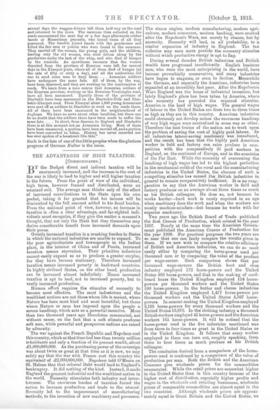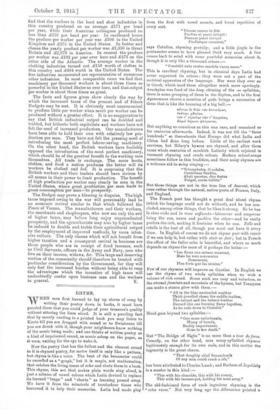THE ADVANTAGES OF HIGH TAXATION. [ComarineicATED.] B Y the Budget direct
and indirect taxation will be enormously increased, and the increase in the cost of the war is likely to lead to higher and still higher taxation in the future. From the point of view of the individual, high taxes, however framed and distributed, seem an unmixed evil. The average man thinks only of the effect of increased contributions to the State upon his own pocket, taking it for granted that his income will be diminished by the full amount added to his fiscal burden. From the national point of view, however, an increase in taxation is often a clear advantage, and far-sighted indi- viduals must recognize, if they give the matter a moment's thought, that not only the State but they themselves may derive considerable benefit from increased demands upon their purse. Greatly increased taxation is a crushing burden to States in which the national industries are unable to expand. To the poor agriculturists and townspeople in the Indian plain, in the interior of China and of Persia, increased taxation means starvation. Their primitive industries cannot easily expand so as to produce a greater surplus, for they have become stationary. Therefore increased taxation means increased poverty in backward countries. In highly civilized States, on the other hand, production can be increased almost indefinitely. Hence increased taxation is apt to lead, not to increased poverty, but to vastly increased production. Human effort requires the stimulus of necessity to become most effective. The most industrious and the wealthiest nations are not those where life is easiest, where Nature has been most kind and most bountiful, but those where Nature or man has imposed upon the people a severe handicap, which acts as a powerful incentive. More than two thousand years ago Herodotus commented, not without cause, on the fact that a soft climate produces 'oft men, while powerful and prosperous nations are raised by adversity.
The war against the French Republic and Napoleon cost this country, which at that time had less than twenty million inhabitants and only a fraction of its present wealth, about £1,000,000,000. As the purchasing power of the sovereign was about twice as great at that time as it is now, we may safely say that the war with France cost this country the equivalent of £2,000,000,000. Napoleon told O'Meara on St. Helena that that colossal Debt would lead to England's bankruptcy. It did nothing of the kind. Instead, it made England the greatest industrial and the wealthiest nation in the world. Necessity stimulates both industry and inven- tiveness. The enormous burden of taxation forced the nation to increase production and trade to the utmost. Necessity led to the improvement of manufacturing methods, to the invention of new machinery and processes. The steam engine, modern manufacturing, modern agri- culture, modern commerce, modern banking, were evolved after the Napoleonic Wars, not merely by chance, but by necessity. Necessity will lead, in all probability, to a. similar expansion of industry in England. The tax collector may once more provide the necessary stimulus without which productive energy is apt to flag.
During several decades British industries and British wealth have progressed insufficiently. English business men, who were the most enterprising in the world, have become proverbially conservative, and many industries have begun to stagnate, or even to decline. Meanwhile the German, and especially the American, industries have expanded at an inciedibly fast pace. After the Napoleonic Wars England was the home of industrial invention, but lately England's place has been taken by America, where also necessity has provided the required stimulus. America is the land of high wages. The general wages of labour in the United States are from two to three times as high as they are in this country. American industries could obviously not develop unless the enormous handicap of very high wages were neutralized in some way or other. Therefore the best brains of the nation net to work upon the problem of saving the cost of highly paid labour. In all industries labour-saving machinery was introduced, and the result has been that the highly paid American worker in field and factory can raise produce in coin- petition with the comparatively ill paid workers in England, on the continent of Europe, and in the countries of the Far East. While the necessity of overcoming the handicap of high wages has led to the highest perfection in the mechanical outfit of the rural and the manufacturing industries in the United States, the absence of such a compelling stimulus has caused the British industries in general to remain comparatively inefficient. It is no exag- geration to say that the American worker in field and factory produces on an average about three times as much as his British colleague. He does so, not because he works harder—bard work is rarely required in an age when machinery does the work and when the workers are mostly machine-minders—but because he works with far superior machinery. Two years ago the British Board of Trade published the first Census of Production, which related to the year 1907. Nearly at the same time the American Govern- ment published the American Census of Production for the year 1909. For practical purposes the two years are so near that one can fairly compare the results given in them. If we now wish to compare the relative efficiency of British and American industries, we can do so most easily either by comparing the horse-power used per thousand men or by comparing the value of the product per wage-earner. Such comparison shows that per thousand wage-earners the British boot and shoe industry employed 172 horse-powers and the United States 486 horse-powers, and that in the making of card- board boxes the 'United Kingdom employed 114 horse- powers per thousand workers and the 'United States 590 horse-powers. In the butter and cheese industries the United Kingdom employed 1,477 horse-powers per thousand workers and the United States 5,507 horse- powers. In cement-making the United Kingdom employed 3,195 horse-powers for every thousand workers and the United States 13,873. In the clothing industry a thousand Britishsvorkers employed 45 horse-powers and the American workers 165 horse-powers. It will be notieed that the horse-power used in the five industries mentioned was from three to four times as great in the United States as in the United Kingdom. It follows that every worker employed in them can turn out, roughly speaking, from three to four times as much produce as his British colleague. The conclusion derived from a comparison of the horse- powers used is confirmed by a comparison of the value of production per man. Both the British and the American Censuses give wholesale prices for the commodities enumerated. While the retail prices are somewhat higher in the United States than in this country because of the higher cost of distribution, especially higher profits and wages in the wholesale and retailing businesses, wholesale prices of comparable commodities are almost equal in the two countries. Although wholesale prices are approxi- mately equal in Great Britain and the United States, we find that the workers in the boot and shoe industries in this country produced on an average £171 per head per year, while their American colleagues produced no less than £516 per head per year. In cardboard boxes the produce per worker per year was £106 in the United Kingdom and £275 in the United States. In butter and cheese the yearly product per worker was £1,310 in Great Britain and £2,979 in America. In cement the produce per worker was £192 per year over here and £472 on the other side of the Atlantic. The average worker in the clothing industries turned out £158 worth of clothes in this country and £484 worth in the United States. The five industries enumerated are representative of numerous other industries. In most comparable cases we find that machinery per thousand workers is about three times as powerful in the United States as over here, and that output per worker is about three times as great.
The facts and figures given show clearly the way by which the increased taxes of the present and of future Budgets may be met. It is obviously most uneconomical to produce little per worker when much per worker can be produced without a greater effort. It is no exaggeration to say that British industrial output can be doubled and trebled, but hitherto both capitalists and workers have not felt the need of increased production. Our manufacturers have been able to hold their own with relatively low pro- duction per man. They have not felt the pressing need of introducing the most perfect labour-saving machinery. On the other hand, the British workers have foolishly opposed the introduction of the most perfect machinery, which should be of the greatest benefit to the working men themselves. All trade is exchange. The more boots, clothes, and food a nation produces the better will its 'workers be clothed and fed. It is surprising that the British workers and their leaders should have striven by all means in their power to limit production. The benefit of high production per worker may clearly be seen in the United States, where great production per man leads to ,great consumption per man—to prosperity.
The Budget may prove a blessing in disguise. The high taxes imposed owing to the war will presumably lead to an economic revival similar to that which followed the Peace of Vienna. The manufacturers and their workers, the merchants and shopkeepers' who now see only the evil of higher taxes, may before long enjoy unprecedented prosperity, and the agriculturists may also by higher taxes be induced to double and treble their agricultural output by the employment of improved methods, by more inten- sive culture. The only classes which will not benefit from higher taxation and a consequent revival in business are those people who are in receipt of fixed incomes, such as Civil Servants, officers in the Army and Navy, men who live on their income, widows, &c. This large and deserving section of the community should therefore be treated with particular consideration by the Government, for they will only feel the increased burden without being able to reap the advantages which the incentive of high taxes will undoubtedly confer upon business men and the workers















































 Previous page
Previous page